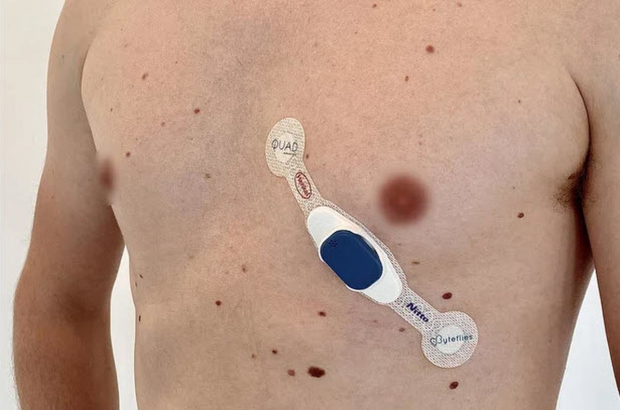- Daily & Weekly newsletters
- Buy & download The Bulletin
- Comment on our articles
Smart patch keeps an eye on coronavirus symptoms
A patch that can monitor the breathing, heart rate and temperature of coronavirus patients is being developed by a group of Flemish companies, East Limburg Hospital and Hasselt University. The aim is to allow patients to be monitored remotely, reducing the risk to health-care workers and reducing hospitalisations.
The smart patch is about 15cm long and needs to be stuck to the left side of the patient’s chest, near the heart. It then continuously monitors heart rate and breathing, sending the data by a wireless connection to the doctor and nurses on the patient’s medical team.
The researchers are currently working to add temperature measurement to the patch’s capabilities, since this is an important symptom in following the progress of a coronavirus infection.
The patch can operate independently for five days before it needs to be replaced. This is simple to do and requires no medical training.
“Currently, the vital signs of most Covid-19 patients are recorded manually,” explained Hans De Clercq of Antwerp medtech company Byteflies, a partner in the project. “Staff in both hospitals and care homes check them several times a day and then process the data manually. Our system has the potential to save them a lot of time, and also to limit their exposure to possible contamination.”
The other companies involved in the project are semiconductor developer Melexis in Ypres; Quad in Sint-Niklaas, specialised in flexible sensors; tech communications firm Televic in Izegem and Z-Plus in Ghent, working in the area of healthcare technology.
Local operations of multinationals Henkel and Nitto, both specialised in adhesive technologies, are also involved in the project. Hasselt University contributed its expertise, and the patch is being tested in East Limburg Hospital.
“We are already running tests with remote monitoring, where patients take measurements by hand, so this patch may be an interesting extension of that,” said Pieter Vandervoort, a cardiologist and co-ordinator of the hospital’s Future Health unit. “That’s why we will start testing on 20 of our patients as soon as possible.”
As well as lessening the contact between health workers and Covid-19 patients, the patch is expected to be useful for patients quarantined at home or who live in residential care homes.
“You no longer have to measure your vitals yourself and pass them on to your doctor. This all happens automatically,” explains De Clercq. “The system also provides more peace of mind. You’re sure that the measurements are correct and that you are monitored constantly.”



















